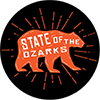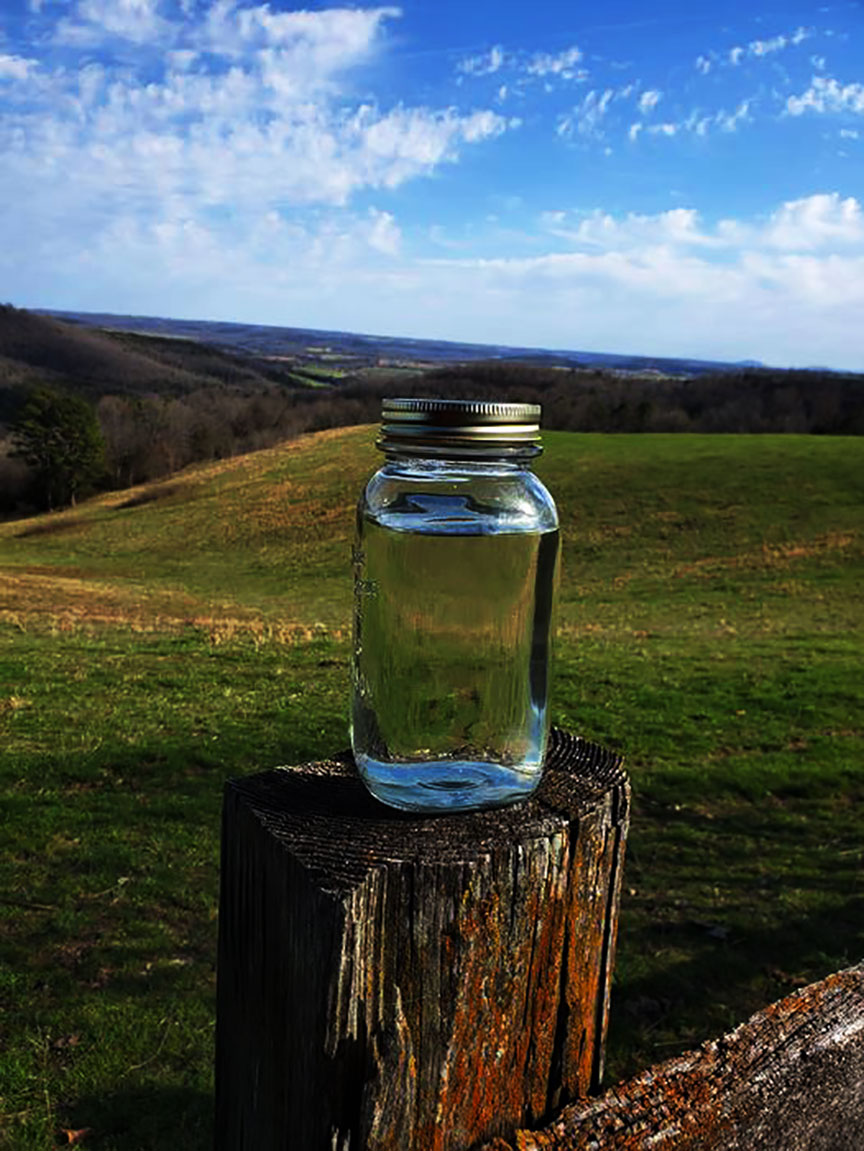Whiskey Men and Wildcat
by Travis Holt
Moonshine, so often associated with Appalachia, is an integral part of Ozarks culture.
Growing up in the hills of Newton County, Arkansas, I lived a privileged life. I got to know a good amount about my ancestors and hear of their stories and experiences. Though most of my family were straight-laced, hard-working and proud folks, I would occasionally hear the whispered word of something illicit, something forbidden and frowned upon, yet something that permeated the culture in which I lived.
That something was moonshine whiskey.
Growing up in the hills of Newton County, there were many legends.
Some of these legends took the form of people. And a handful of those people I knew well.
Sometimes Newton County legends were about an event that captured the imaginations of those around and passed into memory. Brawls or murders stand out like that. But of all the legends, there is one set that stands out amongst the others: moonshine whiskey.
Let me be the first to say there are few other subjects which draw such a range of emotion. I have seen happiness and disgust, pride and shame, grins and tears. Moonshine whiskey profoundly impacted our culture.
Growing up in what I consider the “post-whiskey” era (I was born in late 1987), I still was privileged to know a few who took part in the trade. Many of the wildcat purveyors were long gone by then but their names were spoken in whispered tones.
“Whiskey men” is what my great-uncle and grandfather called them. Most whiskey men involved their own families in the illicit liquor trade but some men managed to remain anonymous about their work — or nearly so — even years after their deaths.
Such was the secrecy of the trade. My grandfather told us his father’s wish that none of his own kids would make whiskey though grandfather made it himself. He refused to teach his sons and the trade died with him.
My second great-grandfather, George Washington Freeman, was a whiskey man who taught his sons the trade. He always said a man would get caught if he made it look like he was “makin’ whiskey.” His cover? Great-grandfather worked the fields all day and made whiskey at night. We still don’t know when he slept. George’s saving grace was he had his still in a remote cave on the farm. That cave — more of a “crack in the bluff” — had a cold, clear spring running in it. Once he’d made his whiskey, he had to break down his kegs and feed the wood through the narrow cave opening. He re-assembled the kegs on the other side. The whiskey trade meant he could feed his family through hard times. My great-grandfather was not alone.
The whole concept of the “rich moonshiner” is ponderous to those of us who have known whiskey men and understood the way they lived. Some get the idea that a hillbilly with a big corn crop distilled alcohol fast and easy and stuffed the profits under his mattress.
The truth was far from that.
The average whiskey man in the Ozarks got his recipe handed down through the generations. Whiskey making was practiced as an art, a craft to be mastered, a trade to honor past generations. The whiskey man practiced his trade, initially, not to turn a profit, but to provide him with liquor for medicinal and (admittedly) other uses. This was the foundation of the now-legendary Ozarks moonshiner.
Some whiskey men learned their own recipe or method was superior to others. Time evolved the making of “wildcat” — as most of my forebears would never call it “moonshine” — to a near perfection through trial and error. A good recipe was crucial. Over the years, whiskey men naturally experimented in changing “this or that” in their recipes. The results were sometimes amazing.
The Ozarks were, and are, a poor country, by most all standards. The folks who settled here were a hard working, superstitious, clannish and (most of all) proud people. The hills and hollers they settled and farmed often belong to their offspring today.
Wildcat was always in the hills but the idea of it being more than a bartering agent didn’t come along until the Prohibition and the Great Depression.
When a man has a wife and children to feed, the legality of how he comes by a dollar starts to mean less. Not that I’m saying that my bunch (or others) were criminals born, nor that they took such things lightly; they simply had a skill passed to them that could prove profitable. In fact, most of the whiskey men I knew only took to the craft to support and feed their families. It wasn’t a “get rich quick” scheme but a “keep the kids fed” scheme.
Those with a small understanding of the big picture overlook this; not that I’m making excuses for the whiskey men. Some stories say they did plenty of evil in their time and what I’ve heard of Yates “Wolfman” Standridge belongs in another tale. But there were plenty who did nothing but mind their stills and use the money to literally just buy their children shoes.
This is a small essay on wildcat, and it, like anything short of a multi-volume work, cannot truly explain the making nor the importance of moonshine whiskey to our culture.
Fact of it is, even though moonshine is often associated with Appalachia, our ancestors brought whiskey-making with them when they settled the wilds of the Ozarks. Moonshine whiskey is as much a part of our Ozarks culture as it is Appalachia’s. Wildcat has been involved in love and war, feuds and reconciliations, marriages and burials. So many aspects of our ancestors’ lives have been touched by wildcat whiskey.
It is admittedly hard to write an objective piece on something that has brought so much heartache but also so much joy. Good or bad, moonshine whiskey is a part of our heritage and our people.
I’ll close this piece with a story of my own people:
In the 1960s in the poor backwoods of Newton County, my grandfather Meckey and his cousin were saddled with driving 50 gallons of wildcat to a buyer. They rolled through the quiet dark in a ’55 Ford. Both teenagers were jumpy about being placed behind the wheel but knew the success of this trip meant money for the family.
My grandfather’s cousin — gripping the wheel — turned suddenly. “Meckey, what if we get caught?’’
Papa fished around and, finding a tire iron, brandished it. “If we get pulled over, I’ll break every jar in here!”
His cohort thought about that a minute before replying. “Hell, Meckey! That’d drown us both!”





